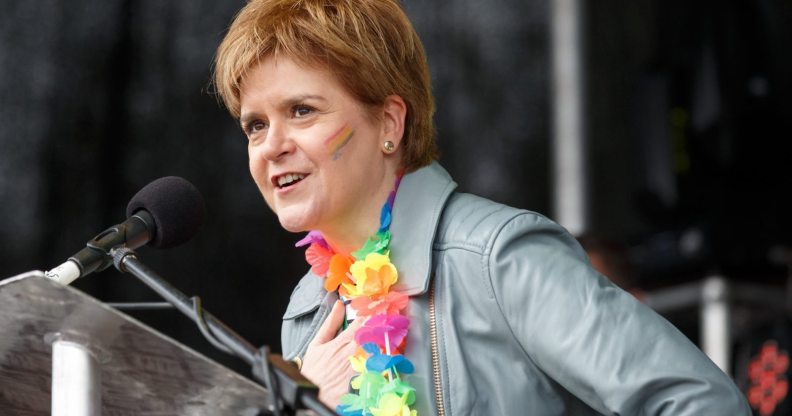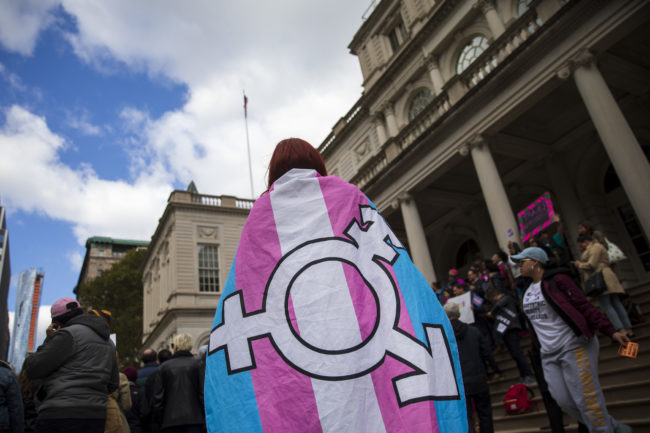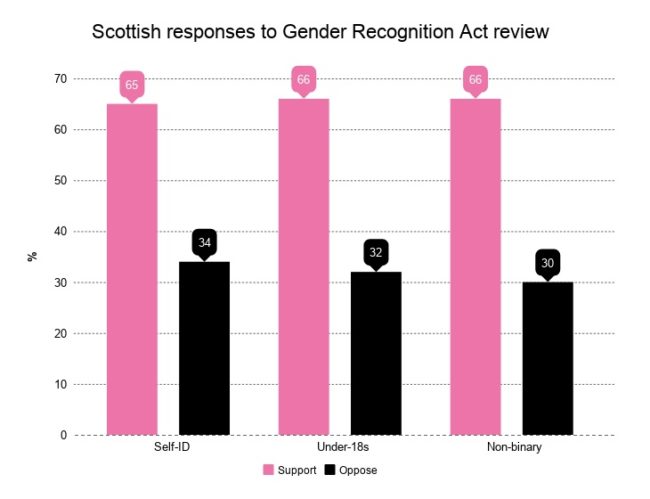Scotland supports transgender self-ID law, consultation finds

Scotland’s First Minister Nicola Sturgeon at Glasgow Pride (Getty)
Scotland’s consultation on the Gender Recognition Act has found widespread support for ‘self-ID’ reforms.
The Scottish government had been holding a consultation on the future of the Gender Recognition Act, considering a devolved law in Scotland that would extend and streamline provisions.
Although anti-transgender activists organised a mass of responses to the Scottish proposals and a separate UK government consultation, the Scottish government’s findings show a majority of responses favoured change.

A person in a transgender flag (Drew Angerer/Getty)
The full consultation results published on Friday (November 23) show that 60 percent of people back “a self-declaratory system for legal gender recognition” that would eliminate requirements for transgender people to obtain medical evidence, with 39 percent opposed.
61 percent backed changes to allow transgender teens to access the gender recognition process from age 16, while 62 percent said that non-binary people should also be able to gain legal recognition.
Respondents from outside Scotland more likely to oppose self-ID
The online consultation was available to fill out from anywhere, but when responses from outside Scotland are excluded support for the self-ID system rises to 65 percent. Half of respondents from outside Scotland opposed changes.

With non-Scotland responses excluded, support for self-ID, non-binary recognition and trans teen recognition is high.
Respondents who were actually from Scotland were also much less likely to express concerns that “self-declaration may pose a risk to women’s safety in spaces including single sex spaces such as toilets, changing rooms, hospital wards and refuges,” the Scottish government noted.
The government added that there were suggestions “that groups opposed to the proposed reforms have spread information about the consultation on line and have encouraged their supporters to respond,” that “may skew the results.”
Scottish government will bring forward gender recognition changes
The Scottish government explains that people supporting self-ID changes generally said that “the existing gender recognition process takes too long, is too difficult or too expensive.”
The existing process, which requires trans people to submit evidence to a Gender Recognition Panel, was described as “demeaning, intrusive, distressing or stressful for applicants.”
The Scottish government is yet to publish a full response to the analysis.
A spokesperson for the Scottish Government said: “We have now published the independent analysis of responses.
“We will consider this analysis and the views of consultees as we take forward our commitment to bring forward legislation on gender recognition.”
James Morton of the Scottish Trans Alliance told The Scotsman: “While advancing equality for minority groups does not depend on opinion polling, it is always great to see high levels of consultation support.
“We also welcome that opponents of the reforms have been able to freely share their views with the Government, as we believe that constructive dialogue and close scrutiny of legislation proposals is always helpful in ensuring there will be no unintended consequences.”
The current Gender Recognition Act (GRA), passed in 2004, is a UK-wide law, but Scotland plans to move forward with a devolved law to reform it.
The UK government is yet to publish results from its own GRA consultation, which would impact the law in England, Wales and Northern Ireland.
UK Prime Minister Theresa May told the 2017 PinkNews Awards that she would bring forward plans to de-medicalise the process.

